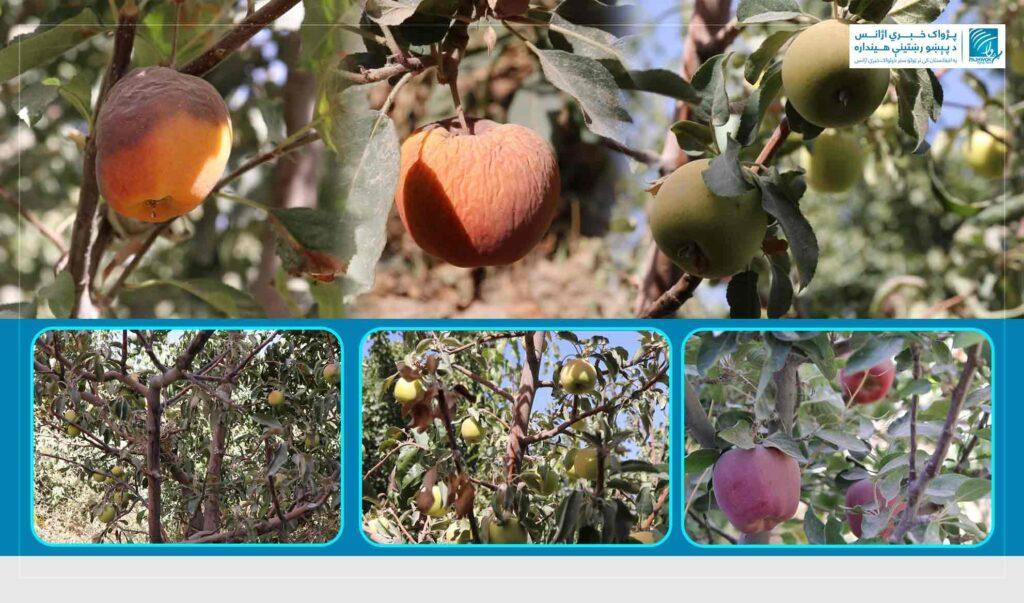
Drought Effects: Ghazni Farmers Lament Low Yields This Year
GHAZNI CITY (Pajhwok): Farmers and orchard owners in southern Ghazni province complain about poor harvests this year due to drought and ask the government to construct dams to address water shortages.
Climate change impact on Afghanistan
The climate is rapidly changing in different parts of Afghanistan, causing droughts in some areas and heavy storms, rainfall, and floods in others.
Although Afghanistan contributes only 0.19 percent of global greenhouse gas emissions, it ranks fourth among countries most affected by climate change. This situation has heavily impacted the agriculture sector, which remains the primary source of livelihood for nearly 80 percent of Afghans.
Irregular rains and floods linked to climate change also contribute to reduced or lost crop yields.
Drought-stricken farmers in Ghazni
Noorullah, a farmer from Nobarjak area of Khawaja Umari district,, told Pajhwok Afghan News the climate is generally suitable for apple trees, whose fruits mature in autumn, but this year drought reduced orchard yields.
He said last year his apple orchard produced 5,600kg of apples, while this year it yielded only 2,100kg.
The crops that did grow were affected by diseases and struggled to reach the market.
Noorullah urged the government and aid agencies to support water supply projects and build dams to prevent future losses.
Zabiullah, another farmer from Aqasi area, explained drought affected not only apple orchards but also other crops.
He added:“Crop yields and quality have declined due to the dry spell.“In previous years, I sold seven kilo grams of apples for 200 afghanis, but this year it the same quantity was sold for only 40 afghanis.”
Farmers are currently relying on water tankers to irrigate their orchards and prevent them from drying out.
Ahmad Jawed Anwari, another farmer of Qala-i-Naw area, claimed drought has reduced yields of wheat, maize, barley, beans, chickpeas, onions, potatoes, and vegetables, in addition to fruits.
Farmers who previously earned hundreds of thousands of afghanis now earn only a few thousands, he added.
He called on the government to address farmers' problems, build large and small dams, raise public awareness, and take measures to prevent drought.
Agricultural and economic experts say climate change has serious negative effects on Afghanistan's agriculture, leading to reduced crop yields.
Proposed solutions
Climate expert Hasibullah Samim told Pajhwok that climate change has not only affected Khawaja Umari district, but also many other regions of Afghanistan.
He said constructing reservoirs in Ghazni and other remote areas could help mitigate water shortages.
AILD officials explained that drought this year has reduced crop yields compared to previous years.
Efforts by IEA to address farmers' challenges
According to AILD official Qari Zakaria Hotak, no water was stored in the Sultan Dam this year in Khwaja Umari for mitigation, causing losses to locals and farmers.
Several small dams have been constructed in Malistan and Ajristan districts and efforts are underway to build more dams across Ghazni to raise water levels and help farmers, he added.
About 99 percent of Khwaja Umari's population depends on agriculture and livestock for their livelihoods.
hz/ma

Legal Disclaimer:
MENAFN provides the
information “as is” without warranty of any kind. We do not accept
any responsibility or liability for the accuracy, content, images,
videos, licenses, completeness, legality, or reliability of the information
contained in this article. If you have any complaints or copyright
issues related to this article, kindly contact the provider above.


















Comments
No comment